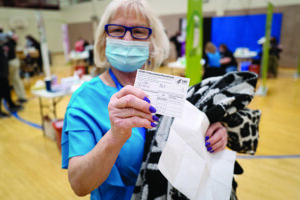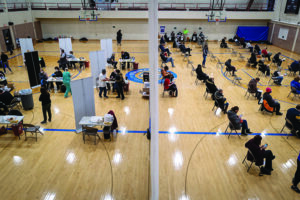Productivity, protection and privacy
5/5/2021What happens when employers and employees disagree on COVID-19 vaccinations?
When many business owners closed their doors and sent employees home to work remotely, and/or instituted social distancing policies in response to COVID-19, the ensuing impact on their bottom line left them wondering if their business would survive the pandemic. Many pinned their hopes on the day that a vaccine would be available, thinking that wide-spread vaccinations would allow their businesses to return to pre-pandemic volumes.
Yet, even as vaccinations are being made available to all adults who want one, a significant portion of the workforce is opting to pass.
Studies are “indicating that employees opting against vaccination will indeed be an issue,” said Rob Robertson, owner of Briggs Capital, a boutique international investment bank, and guest lecturer at top-flight MBA schools and business forums.
“According to research by the Society for Human Resources Management (SHRM), 40% of workers will “probably not” or “definitely not” get the vaccine; 28% say they would not get vaccinated if their employer required it — even if that decision meant risking termination,” said Robertson.
This has left employers in the difficult position of trying to balance protecting the health of employees and customers with respecting individuals’ desires to decide when — and if — they get vaccinated. Most employers, especially in small businesses, indicated in the SHRM survey that they don’t want to require vaccines. Some companies, however, are encouraging them. Some are even offering incentives.
“Large companies such as McDonald’s and Target are paying employees to get the vaccine,” says Robertson.
While many employers may want to stop short of requiring the vaccines, some will be obligated to do so to protect the public and to make the workplace safe, says Brent L. Hinders, attorney at law with Hopkins & Huebner in Des Moines.
Work disrupted
Employers following guidelines from the Centers for Disease Control (CDC) and public health departments have required those with COVID-19 symptoms or positive test results, as well as those exposed to the virus, to quarantine for a prescribed number of days. Following such guidelines, an employee might have to be quarantined more than once. While many employees have been able to work from home, many have not, leaving employers short on staff, often without time to plan.
Des Moines Public Schools is one employer which “commonly” has staff under quarantine, necessitating “all hands on deck” to cover their duties, said Health Services Supervisor Diane Gladson MS, BSN, RN. Gladson supervises the district’s 68 nurses and four audiologists.
The district was “creative” in covering for teachers in quarantine, said Gladson.
“We had subs floating in each building, and administration was assigned to cover classrooms and duties such as lunchroom and recess,” she said.
The district partnered with MercyOne to offer vaccination clinics at the Central Campus starting in February. Four clinics have been held, and Gladson says approximately 3,000 of the district’s 5,000 staff members were vaccinated at one of those clinics.
“The clinics were extremely successful with more than 50% of staff getting vaccinated,” said Gladson. District staff members, including Gladson, volunteered to help at the clinics.
The City of Des Moines offered on-site vaccination opportunities, said Human Resources Director James Wells, SPHR, CLRP.
“The City began on-site vaccinations for first responders back in January,” he said. “Through agreements with the public safety bargaining units, the City provided firefighters and police officers paid time to vaccinate and paid leave for employees who could not return to work due to a reaction to their shot(s). Approximately two-thirds of first responders received their vaccinations through the on-site program.”
More recently, Wells said the City partnered with local pharmacies to offer City employees reserved appointments to vaccinate.
“Similar to first responders, the City offered employees paid time to vaccinate and paid leave for employees who could not return to work due to a reaction to their shot(s). About 350 employees received their vaccinations through this program,” he said.
The Des Moines school district does not keep a record of who is and isn’t vaccinated, said Gladson.
“We don’t ask staff for that confidential information,” she said, adding that, while the district doesn’t require staff to get vaccinated, it does “promote and educate about the vaccine.”
Gladson stresses that the district shares the CDC and public health guidelines that recommend people get vaccinated. The district helps inform staff about how to sign up for vaccination clinics that are available and, “the last few weeks, we’ve encouraged people to reach out to their health care providers,” which now have vaccines available, she said.
The City has also encouraged staff to get vaccinated, said Wells.
“Information supporting vaccinations has been disseminated to employees through messages from the City Manager. We have also provided and posted numerous COVID-19 resources on the City’s employee portal,” he said.
Fully vaccinated employees don’t face the same quarantine requirements as non-vaccinated people if exposed to COVID-19, according to the CDC, and, since the school district follows these guidelines, then having vaccinated employees will mean fewer days missed by staff for quarantine, Gladson said.
Gladson said the district’s COVID-19 numbers have been “very controlled” due to precautions such as mandated face coverings.
“At this time, the City is not mandating employee vaccinations,” said Wells. “As part of our employee health screening and contact tracing, employees will be asked if they are fully vaccinated because fully vaccinated employees have a shorter self-quarantine period, if any, than non-vaccinated employees.”

Patricia Trotter, a special education associate in the All Points program at Central Campus, shows off her vaccination card after being the first person through the line at the DMPS staff clinic held in February. Photo courtesy of Des Moines Public Schools.
Current legal issues
Even if an employer doesn’t want to require vaccines for employees, the employer must take steps to protect the public. Although Iowa has passed a law protecting employers if someone should contract COVID-19 at their business, employers are not prot
ected if they acted “recklessly.” And, not following CDC or public health guidelines could be construed as “reckless and knowingly putting others at risk,” said Hinders.
“If a job is client-facing, such as sales, front desk, restaurant, retail employees, you can say they need to be vaccinated,” said Hinders. In addition, employees who work with susceptible people who are at higher risk from COVID-19 can be required to be vaccinated, he said. This might include health care workers and school employees.
For businesses such as manufacturing plants, employers are expected to follow OSHA guidelines for protecting employees.
“Employers have to look at how to keep others safe — what do the CDC and OSHA say,” said Hinders. If the employee can’t “effectively do the job while social distancing, then the CDC or OSHA could recommend vaccinations.”
If an employer is “acting in contradiction to recommendations,” then the question about recklessness can arise, he said.
However, a blanket requirement for staff to get vaccinated may not be enforceable.
“If a person works from home, it’s hard to say they need to be vaccinated,” says Hinders. “That person has a better chance of arguing they don’t need to be vaccinated.”
Hinders stresses, as with all health-related information, it is “incumbent on the employer” to keep the information about an employee’s vaccination status “secured” and only available to select supervisors with a need to know that information.
A senate file in the Iowa Legislature could upend current law. It proposes making individuals’ vaccination decisions “a protected class, in essence,” says Hinders. If this were to become law, then anyone who had action taken against them due to vaccination status could file a civil rights lawsuit.
“There is momentum in Iowa not to require vaccinations,” says Hinders. “This is a completely new idea that has sprung forward — a real shift in the last few months.
“I’m not in health care or in education, but to eliminate vaccination requirements sets a bad precedent,” said Hinders, adding that such a requirement would have to apply to all vaccines, which would put many people “with compromised immune systems” at risk. “It’s a very, very dangerous thing to do.”
What is an employer to do?
While some employers may encourage employees to get vaccinated, they are faced with the reality that many won’t.
“Fear and uncertainty are big factors driving some employees away from vaccines,” said Robertson. “In the SHRM survey, employees’ reasons to not get vaccinated include possible side effects (69%); waiting to see if it’s safe and possibly getting the shot or shots later (58%); not trusting COVID-19 vaccines (41%); not knowing if it will work (32%); concerned with having an allergic reaction (27%); and several others.”
For those employees who don’t get vaccinated but are concerned about working on-site, Robertson suggests, “If at all possible, the organization would make that employee a remote worker through the end of 2021, or at the point of herd immunity. After one of those time frames, the employee would have to rejoin the workforce in the office.”
In the meantime, Robertson expects “this time lag would allow the government guidelines to come out. A government proclamation that herd immunity has been reached, along with a confirmation within the company … that sufficient vaccination levels have been reached, should dissipate most fears that those who are not vaccinated have harbored. Thus, a return to work is justifiable.”

Des Moines Public Schools partnered with MercyOne to hold its first vaccination clinic for staff in February. Photo courtesy of Des Moines Public Schools
Try to accommodate — to an extent
“Some business owners see vaccinations as essential to a full reopening, but others are reluctant to mandate vaccinations, thinking there might be legal liability for firing workers because they won’t get the vaccine,” said Robertson.
His answer?
First, try to persuade employees that co-workers will be more at ease if they are vaccinated. And, “perhaps incentives are in order — a day or two off with pay or a $300 bonus could suffice,” he says. However, “perceived employee coercion must be avoided at all costs,” he warns.
In addition, he said, “All efforts should be made to reassign the employee to a remote work position, or to have them work in physical spaces that prevent them from endangering other employees. Each step in this process should be documented, and management should have the non-complying employee sign off on each step in this ‘accommodation process.’ ” he says.
The City of Des Moines is requiring staff to return to work and are dealing with requests for accommodation individually.
“Just over a year ago, employees that had work that could be performed from home and that had the ability to work from home, were directed to work from home,” said Wells. “City facilities are planned to reopen for appointments May 1 and fully reopen to the public June 1. All employees are expected to return,” he said.
However, the City will continue to follow COVID-19 policies and guidelines, said Wells. That includes requiring face masks, social distancing and sanitizing work spaces. Employees seeking an accommodation are directed to Human Resources with their request.
Bottom line, Robertson said, “Don’t waste company time addressing anti-vaccination beliefs and fears. Fears are difficult to overcome. With companies showing they care about employee health by allowing work from home for so long, and vaccinations bringing more health security, management should not spend an inordinate amount of valuable company time calming employees’ fears about the shots or trying to sway their beliefs.”
Instead, he suggests management “should set up job evaluations on a monthly basis to give the employee quantitative reviews that will shed light for all parties on the performance or non-performance of the employee. If the employee passes that evaluation, management should then make best efforts to find a new isolated position, and if this is not possible, then the employee, with the company’s blessings, should seek new employment.”
In the end, employees will make decisions based on what is best for them. That may conflict with what company leadership determines is best for the company.
“With vaccinations now available, the ball is in the employee’s court, but leaders must decide when the volleying back and forth will end,” says Robertson. ♦





















